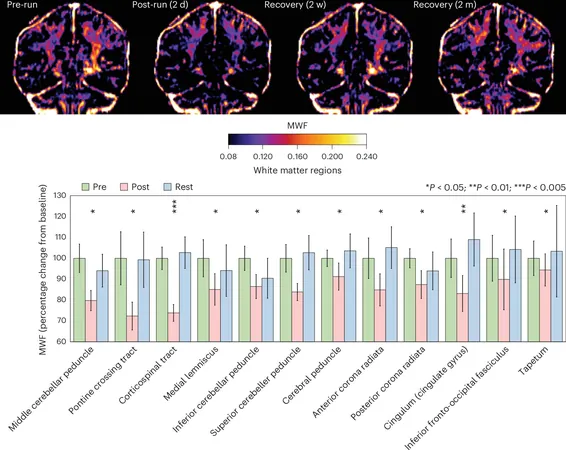
Shocking Discovery: Marathon Running May Cause Temporary Changes in Brain Myelin!
2025-03-25
Author: Jia
Groundbreaking Study Reveals Temporary Myelin Reduction in Marathon Runners
In a groundbreaking study that has sent shockwaves through the scientific community, researchers in Spain have discovered that marathon runners experience a reversible reduction in myelin within their brains during long-distance races. This insight, published in the esteemed journal *Nature Metabolism*, sheds light on the intriguing relationship between intense physical activity and brain health.
Research Methodology
The interdisciplinary team, comprising neurologists, neuroradiologists, and biomaterials specialists, conducted MRI scans of ten marathon runners—eight men and two women—before they tackled the grueling 42-kilometer race. To assess the impact of the marathon, participants underwent additional scans 24 to 48 hours post-race, with follow-up MRI examinations two weeks and two months later for some runners.
Findings of the Study
Astoundingly, every runner showed a decrease in myelin, the protective sheath that insulates nerve cells, in specific areas of the brain following their endurance test. However, the study revealed that this myelin reduction was not permanent; it began to recover shortly after the race and reached baseline levels within two months.
Implications on Brain Metabolism
This phenomenon raises critical questions about brain metabolism during extreme physical exertion. Myelin plays a crucial role in facilitating electrical transmission within the brain, and its temporary loss could imply that the body is utilizing this vital resource for energy. Previous research has indicated that long-distance runners shift their energy sources from carbohydrates to fats once their glycogen stores are depleted. Remarkably, the researchers suggest that myelin might serve as one of those fat sources during exhaustive efforts.
Specific Brain Areas Affected
The study identified reductions in myelin in regions of the brain associated with motor coordination, sensory integration, and emotional processing, although the researchers refrained from linking specific brain areas to the nature of the exercise performed. They emphasize the need for further investigation to comprehensively understand these findings and their implications on cognitive function in athletes.
Cautions and Future Research
Though this research provides tantalizing insights into the impact of long-distance running on brain health, the authors caution against drawing definitive conclusions due to the small sample size. They advocate for larger studies to confirm these findings and explore the underlying mechanisms connecting endurance exercise with alterations in brain structure.
Conclusion
This discovery not only illuminates the physiological effects of marathon running but also raises awareness about the complex interplay between physical activity and mental health. As researchers continue to unravel the mysteries of how our bodies respond to extreme endurance challenges, the long-term effects of running on brain function remain an area ripe for exploration. Could your next marathon run leave a mark on your brain? Stay tuned as we delve deeper into the science of endurance sports!



 Brasil (PT)
Brasil (PT)
 Canada (EN)
Canada (EN)
 Chile (ES)
Chile (ES)
 Česko (CS)
Česko (CS)
 대한민국 (KO)
대한민국 (KO)
 España (ES)
España (ES)
 France (FR)
France (FR)
 Hong Kong (EN)
Hong Kong (EN)
 Italia (IT)
Italia (IT)
 日本 (JA)
日本 (JA)
 Magyarország (HU)
Magyarország (HU)
 Norge (NO)
Norge (NO)
 Polska (PL)
Polska (PL)
 Schweiz (DE)
Schweiz (DE)
 Singapore (EN)
Singapore (EN)
 Sverige (SV)
Sverige (SV)
 Suomi (FI)
Suomi (FI)
 Türkiye (TR)
Türkiye (TR)
 الإمارات العربية المتحدة (AR)
الإمارات العربية المتحدة (AR)